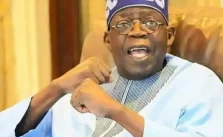By Ben Nsemo
President Bola Tinubu has directed the Ministry of Justice to collaborate with the National Assembly to address concerns raised about the controversial Tax Reform Bills. The directive, issued on Tuesday while the President was in South Africa, comes amid nationwide debates and protests.
The proposed laws—Nigeria Tax Bill 2024, Nigeria Tax Administration Bill, Nigeria Revenue Service (Establishment) Bill, and Joint Revenue Board (Establishment) Bill—have sparked heated discussions. While some groups, including northern youths who staged a demonstration at the National Assembly, have expressed support for the reforms, others, including northern governors and lawmakers, have strongly opposed them.
Concerns Over Fiscal Federalism
Critics argue that the reforms could disrupt the balance of fiscal federalism by centralising tax authority at the federal level, thereby weakening states’ revenue-generating capacity. Opponents, including some northern senators and governors, claim the bills, if passed, could impoverish Nigerians and worsen economic inequality.
The northern governors have also expressed apprehension, suggesting the proposals might undermine the financial independence of states and marginalise certain regions.
Tinubu’s Directive
In a bid to address the concerns, President Tinubu directed the Ministry of Justice and officials involved in drafting the bills to work closely with the National Assembly. The goal is to identify and resolve any legitimate issues before the bills proceed to passage.
A statement issued by the Minister of Information and National Orientation, Mohammed Idris, titled “President Tinubu Committed to Accountability on Tax Bills, Directs Ministry of Justice to Work with NASS on Concerns”, highlighted the President’s commitment to inclusivity.
The statement read:
“In line with established legislative procedures, the Federal Government welcomes meaningful inputs that can address whatever grey areas there may be in the bill. President Tinubu has directed the Ministry of Justice and relevant officials who worked on the drafts to ensure all genuine concerns are resolved before the bills are passed.”
Bills Will Not Be Withdrawn
Despite the opposition, Tinubu has ruled out withdrawing the bills from the National Assembly. The Federal Government assured the public that the reforms are not designed to impoverish any state or region or to scrap or weaken existing federal agencies.
The Minister further noted:
“The fiscal reforms will not impoverish any state or region of the country, neither will they lead to the scrapping or weakening of any federal agencies.”
Welcoming Debate
The Federal Government has also welcomed the vigorous debate on the bills, viewing it as a testament to Nigeria’s democratic values. The statement underscored the government’s belief that public participation and dialogue are critical components of effective policymaking.
Broader Context
The Tax Reform Bills are part of the administration’s broader fiscal reforms aimed at improving transparency, enhancing revenue generation, and ensuring sustainable economic growth. The government has called for constructive engagement from stakeholders to shape a framework that promotes accountability and fiscal equity.
As discussions continue, the outcome of the legislative process will determine the fate of these contentious reforms and their impact on Nigeria’s fiscal landscape.
